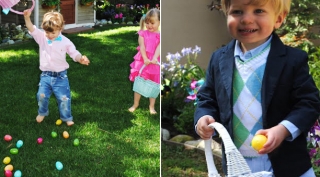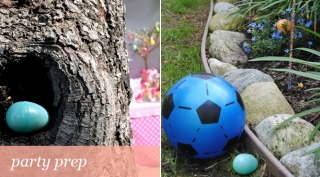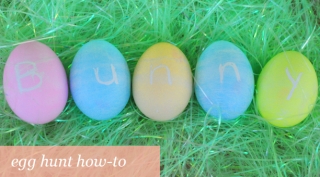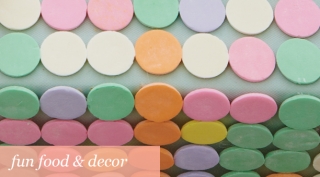
Hosting a children’s Easter party should be fun and easy. So what’s there to do besides hiding some eggs? In fact, young guests (and their parents) will have a better time if you tailor the festivities to their ages. “You don’t want the little kids getting lost in the shuffle or the older ones getting bored—giving the day some structure allows everyone to participate”
With help from Zelken as well as entertaining experts Amy Atlas, Linda Kaye, Xiomara Roman, and Gwynn Wasson, we’ve put together a complete guide to planning and executing a lively and manageable Easter egg hunt for kids of all ages in your home or backyard. Read on for tips on what kind of eggs to use and where to hide them, plus creative ideas for prizes, food, and decor.

Size Up Your Space
First, decide whether your event will happen indoors or out, keeping in mind that even if you’re expecting good weather, you should have a backup rainy-day plan.
Next, define your hunt’s boundaries, which you’ll need to explain to kids and parents before starting. To direct children away from off-limits areas (ponds, neighbors’ yards, roads, thorny bushes), Zelken creates “No Bunny Crossing” signs using foam core or poster board and attaches them to garden stakes with Velcro adhesive strips. Signs can also show that nothing is hidden above a certain height, to prevent intrepid egg-seekers from trying to scale trees. Festive ribbons and strings are other ways to mark the perimeter of your hunt.
Inside, help prevent chaos by restricting the action to one level of the house and having kids take turns searching in small groups. Close doors and hang signs that clearly indicate which rooms to avoid. “You don’t want them ransacking your nightstand or playing in the bathrooms,” says New York celebrity party planner Linda Kaye of Partymakers, a company that specializes in children’s events. Keep babies and toddlers safe by inserting plug covers into electrical outlets, and move any potentially unstable or hazardous furniture out of harm’s way.
Eggs-cellent Ideas
Purists might swear by real eggs for an egg hunt, but it’s easiest to use plastic for the under-three crowd. “They chuck them around, so even hard-boiled eggs can get messy,” says Gwynn Wasson, an event planner based in Pasadena, California. Plan on 5 to 7 eggs each for children ages four and under, and 12 to 15 each for kids ages five and up. “If you’re not up for all the cooking and dyeing, don’t feel guilty using plastic eggs or mixing some plastic in with real ones,” says Kaye. Fill plastic eggs with goodies like Hershey’s Kisses or Annie’s Cheddar Bunnies (a toddler favorite), or opt for a nonedible diversion instead, like Play-Doh.
Real eggs should be hard-boiled no more than three days in advance and kept refrigerated in a tightly sealed container until about an hour before the hunt. If you’re scattering them indoors, make a master list of hiding spots so you don’t have to do a malodorous-egg hunt of your own later.

Age-Appropriate Egg Adventures
For toddlers (up to age two), keep it simple: Spread the eggs out on your lawn or living room floor where they’re clearly visible. “Younger children will be thrilled to get even one plastic egg filled with Cheerios that they can play with all morning,” says Wasson.
If the kids are between ages three and six, choose fairly obvious hiding places, behind rocks or planters and on low tables. You can also assign children specific egg types to look for, whether it’s eggs of a certain color or eggs decorated with a particular shape, number, or letter. (Put an example of what they’re looking for in each child’s basket to help them remember.)
Beyond age six, kids need challenges: Conceal eggs between couch cushions (plastic’s your safest bet here), under bushes, or on low tree limbs. “Set a timer to see who can bring back the most, then try again—it keeps things moving,” says Xiomara Roman of A Styled Fête, an event design firm in Midlothian, Virginia. Or slow down the action by having kids hunt while hopping on one foot, or even tied to a parent, three-legged-race style.
Event stylist Amy Atlas, author of the soon-to-be-published Sweet Designs: Bake It, Craft It, Style It, suggests putting cookies made with letter-shaped cutters inside large plastic egg containers and asking kids to combine their letters into a word that reveals the location of a giant, shareable Easter basket or several smaller prizes. You can accomplish a similar effect with hard-boiled eggs decorated with letters.
Older children will also appreciate math-based hunts, with certain egg colors worth more points, and puzzle challenges, where each person looks for jigsaw pieces hidden inside plastic eggs. Plan on one simple puzzle for each child, and hide the pieces inside eggs of the same color. Then assign each child an egg color to look for to complete their puzzle. You can also offer clues to the eggs’ hiding spots with a treasure map or a list of questions. And if you have only older kids attending, consider scheduling a dusk hunt: Hand out flashlights to help kids scout for real eggs decorated with glow-in-the-dark paint, or clear plastic eggs stuffed with glowing bracelets.
If you’ve got a mixed-age crowd, you can combine any of the ideas above to keep everybody busy and happy. And don’t hesitate to enlist older children to hide eggs for the younger kids and prepare for activities. “It makes them feel invested and gives you fun bonding time,” says Kaye. To keep things calm and fair during the hunt, have kids search in shifts: Babies and toddlers can start while the older ones work on a craft project (such as making bunny ears) or head outside for bunny-hop sack races and egg-and-spoon relays. Then let the older kids hunt while an adult reads books like Knuffle Bunny, The Runaway Bunny, and Here Comes Peter Cottontail to the littler ones. “It’s simple, it’s sweet, it’s pretty priceless, and what kid doesn’t love stories?” says Zelken.
Eyes on the Prize
Besides rewarding the kids who find the most eggs or win games, several experts recommend hiding a few golden eggs containing prizes or coupons to be traded in for larger treats. For neighborhood-wide Easter egg hunts, families can chip in for a big golden-egg bonus, like a scooter. But there are less competitive approaches, too: Wasson “doesn’t do prizes,” preferring instead to send each child home with an inexpensive treat like bubbles or bunny-shaped chalk.
Creative Containers
There are lots of options for gathering Easter eggs and treats beyond the traditional baskets or buckets. Kaye suggests handing out plain paper shopping bags that kids can decorate before the hunt with markers, crayons, glitter glue, stickers, and pom-poms. Crafty types might try Roman’s method of embellishing a small shoebox or other small container with crepe paper that’s cut into fringe or overlapping scallop shapes; for a handle, she punches holes in the box and adds wire wrapped in ribbon. And in addition to filling containers with plastic grass, you can also try some of the pretty shredded paper or biodegradable options.

There are plenty of sweet options for Easter fare, including chocolates, cakes, and cookies. But it’s also thoughtful to offer healthy, kid-friendly snacks. Zelken creates a “Bunny-Trail Mix” buffet with granola, Cheerios, pretzels, and dried fruit; she festoons the tabletop with moss and twigs for a forest-like feel.
In the spirit of the holiday, some planners decorate with sweets. Zelken pins Peeps to a floral or Styrofoam ring to create a wreath for the front door, while Atlas makes table runners with Necco wafers, using a hot-glue gun to attach them to tulle or mesh. Or, just scatter the wafers across a solid-colored tablecloth. Either way, it’s a simple idea that will please the parents, who appreciate a creative and slightly retro design element, as well as the kids, who love fun and color, says Atlas, adding that at children’s parties, happy guests of all ages is really the goal.




No comment